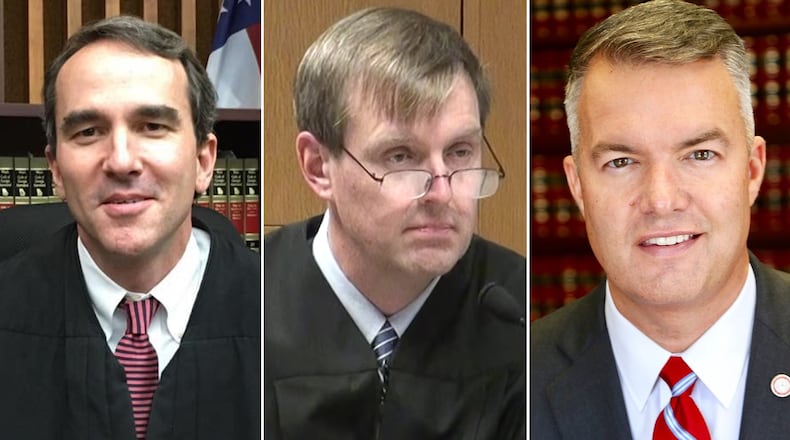Three appeals court judges appointed by Republican governors will decide whether District Attorney Fani Willis should be disqualified from Fulton County’s election interference case against former President Donald Trump.
The assignments came Monday as the Georgia Court of Appeals on Monday officially accepted the case. Oral arguments were tentatively scheduled for Oct. 4.
Judges Todd Markle, Trenton Brown and Benjamin Land were randomly selected by computer to hear what will likely be the highest-profile appeal in the court’s history.
Credit: AP
Credit: AP
Presiding Judge Yvette Miller was initially assigned to the three-judge panel, but she recused herself from the case and was replaced by Brown. Miller is the first Black woman to serve on the appeals court and was appointed by former Democratic Gov. Roy Barnes. It was not immediately clear why Miller stepped aside but she is retiring at the end of the year.
The three judges who will hear the case all served as trial judges before being appointed to the appellate court:
- Markle, who was appointed to the court by Gov. Nathan Deal in 2018, is a former Fulton County Superior Court judge.
- Land, who was appointed to the bench two years ago by Gov. Brian Kemp, is a former Superior Court judge for the six-county Chattahoochee Judicial Circuit in West Georgia.
- Brown, appointed by Deal in 2018, served as a Superior Court judge for the eight-county Ocmulgee Judicial Circuit in central Georgia.
It is highly likely the three-judge panel will hear arguments on this appeal, although the court vast majority of the cases the court hears are decided without oral arguments.
Marietta attorney Ashleigh Merchant, who represents Mike Roman, one of Trump’s 14 remaining co-defendants in the racketeering case, said she will ask the court to hear oral arguments. In a January filing, Merchant was the first defense attorney in the case to move for Willis’ disqualification.
The panel is not expected to issue a decision before voters cast their votes in the presidential election this fall.
The Georgia Constitution mandates that the matter must be decided within two terms of court, which means the justices would need to rule before mid-March 2025. It’s possible the judges could agree to expedite the timeline, but most cases are decided roughly eight-and-a-half months after they’re first docketed, according to court observers.
The appeals court is one of the busiest of its kind in the country. Its 15 members are non-partisan and elected in staggered, six-year terms, though most of the current membership was appointed by sitting governors and subsequently reelected.
The announcement came not long after the clerk of Fulton Superior Court sent thousands of pages of background documents to the appeals court. Among the transmitted paperwork: copies of the indictment, bond orders for the nine defendants who sought out the appeal, prior court filings and rulings from Judge Scott McAfee. The court also sent transcripts of the February evidentiary hearing that included sworn testimony from Willis and Nathan Wade, the former special prosecutor whose romantic relationship with the DA prompted defendants’ push to remove the entire office from the case.
McAfee issued a ruling in March that allowed Willis to stay on the case if Wade departed the prosecution. Wade authored his letter of resignation that day, but that didn’t satiate the defendants, who said Willis still had a conflict of interest that warranted her removal. They appealed McAfee’s ruling, and the appeals court agreed last month to take up the matter.
The panel won’t be collecting new evidence. It will instead determine whether McAfee arrived at the correct legal conclusions.
In a statement, Trump’s lead Atlanta attorney, Steve Sadow, said he looked forward to presenting arguments before the three judges on why Willis should be removed from the case.
Keep Reading
The Latest
Featured





